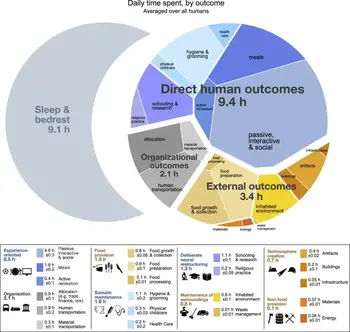New research has unveiled a fascinating insight into how people across the world spend their daily 24 hours. With a global population of approximately 8 billion, this translates to an astonishing 190 billion human hours every day. How we distribute this time has profound implications for our environment and life experiences. To gain a deeper understanding of how individuals worldwide allocate their time, a team from McGill University embarked on an extensive study, offering an unprecedented glimpse into a typical day on our planet.
Eric Galbraith, a professor in Earth System Science at McGill University and the senior author of the study, emphasized the need for fresh perspectives in addressing global challenges. He stated, “If we are to sustainably navigate climate change and biodiversity loss, adapt to rapid technological change, and achieve global development goals, it is crucial to understand the big picture of how the global human system functions, so that we can see where there is potential for change.”

The research aimed to provide a holistic, bird’s-eye view of our collective daily activities. William Fajzel, a Ph.D. student in Earth System Science at McGill University and the first author of the study, explained their objective: “We wanted to know – what does the time allocation of humanity look like, averaged over all people and across all countries? In other words, if the world were a single average person, what would their day look like?”
To answer this question, the research team analyzed time use and labor data spanning from 2000 to 2019, a period that excluded any impacts from the COVID-19 pandemic. They gathered data from over 140 countries, representing 87% of the world’s population.
The researchers categorized all the activities people engage in during their waking hours, encompassing both work-related and non-work-related activities. These activities were classified into 24 categories falling into three broad groups:
- Activities intended to alter the external world, including tasks related to food, energy, construction, and environmental maintenance.
- Activities focused directly on human minds or bodies, encompassing personal care, education, leisure, socializing, and more.
- Organizing activities within society, such as transportation, trade, finance, law, and governance.
In their meticulous analysis, the team manually classified nearly 4,000 distinct activities, leading to some intriguing findings.
The most significant portion of our daily hours is devoted to activities centered around humans, totaling just over 9 hours. Additionally, sleep or being in bed accounts for another 9 hours, including the longer sleep patterns observed in youth. Of the remaining 6 hours, various tasks like food cultivation and preparation, commuting, and allocation-related duties (e.g., trade, finance, sales, law, governance, policing) each occupy approximately 1 hour. Astonishingly, waste management claims only 1 minute of our global day, a sharp contrast to the 45 minutes spent on cleaning and maintaining our living spaces. Furthermore, all construction and infrastructure-related activities take up just about 15 minutes.
Interestingly, the study found that the time allocated to activities like meals, daily travel, personal hygiene, and food preparation does not exhibit a systematic relationship with a population’s material wealth. In contrast, the time spent on food cultivation and collection displayed a strong correlation with economic status, varying from over 1 hour in low-income countries to less than 5 minutes in high-income countries.
Approximately one-tenth of the day is dedicated to economic activities. This includes both economic and non-economic activities. Within these categories, some of the total time represents individuals engaged in economic activities, such as doctors, nurses, cooks, and agricultural laborers.
The research team estimated that the entire global economy occupies approximately 2.6 hours of the average human day. Agriculture and livestock production dominate this economic activity, followed by allocational activities like trade, finance, law, and manufacturing. While this 2.6-hour figure may appear small, it equates to a 40-hour workweek for the two-thirds of the world’s working-age population (ages 15-64) that comprise the labor force.
These findings offer a unique perspective on the interplay between economic activities and the broader tapestry of human life on a global scale. They also suggest opportunities to reevaluate the allocation of time among specific activities, such as resource extraction, energy provisioning, and waste management, which currently require only around seven minutes of our daily lives.
